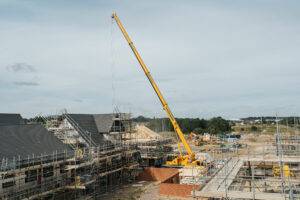Donaldson Timber Systems (DTS) was proud to support a recent visit from members of the House of Lords’ Built Environment Committee as part of its inquiry into the future of modern methods of construction (MMC).
Chair of the Lords Select Committee, Lord Moylan, along with Lord Best, Baroness Eaton, Lord Faulkner of Worcester, Earl Russell, and Baroness Thornhill, first visited West Herts College’s, Hemel Hempstead campus to learn more about the apprenticeship programme offered in partnership with DTS.
As announced earlier this year, the 2.5-year programme, open to students on the College’s Level 2 City and Guilds carpentry course, comprises four days per week working on-site, and one day per week attending the College. The in-class modules include an additional module that will focus on MMC for offsite manufactured timber frame, which was developed in partnership with DTS. This covers an understanding of construction technology; health and safety; an introduction to MMC and offsite timber frame build systems; together with understanding construction information, materials, and the installation process, including site project communications.
The Committee then travelled to Spencer’s Park in Hemel Hempstead, a Countryside Partnerships development, to see first-hand MMC actually taking place on site. The 600-plot development has built its houses using DTS’ Sigma II closed panel timber frame system.
The award-winning, BOPAS+ accredited and BBA Certified build system, is designed to achieve superior levels of external wall performance, suitable for projects seeking to attain the very highest fabric efficiency standards. With excellent thermal properties and air-tightness, the Sigma® II Build System offers reduced on-site material and labour costs, by using conventional materials in a more effective manner.
Simon Horn, Technical Development Manager at DTS, said: “The visit from members of the Lords Select Committee was an extremely valuable opportunity to demonstrate our commitment to the future of MMC and the wider timber frame industry, through our partnership with West Herts College, as well as showcase the benefits of MMC on a live site at Countryside Partnerships, Spencer’s Park, Hemel Hempstead.”
“Although the Committee’s inquiry is investigating some of the recent challenges the industry has faced with MMC and Cat 1 Volumetric build systems, we were proud to show them our success and the importance of investing in established, sustainable technologies, for Cat 2 Panelised build systems and in training the next generation. We thank the members of the Committee for their time.”
Gill Worgan, Principal and CEO at West Herts College said: “We were delighted to welcome members of the House of Lords Built Environment Committee and colleagues from Donaldson Timber Systems to our Construction and Engineering Centre at our Hemel Hempstead campus.
“The visit provided a valuable platform for discussions surrounding the evolution of construction skills and the pivotal role modern methods of construction play in shaping the industry’s future.
At West Herts College we’re working closely with employers such as Donaldson Timber Systems to ensure that our students are equipped with the modern skills required to step into careers in the construction sector.”
